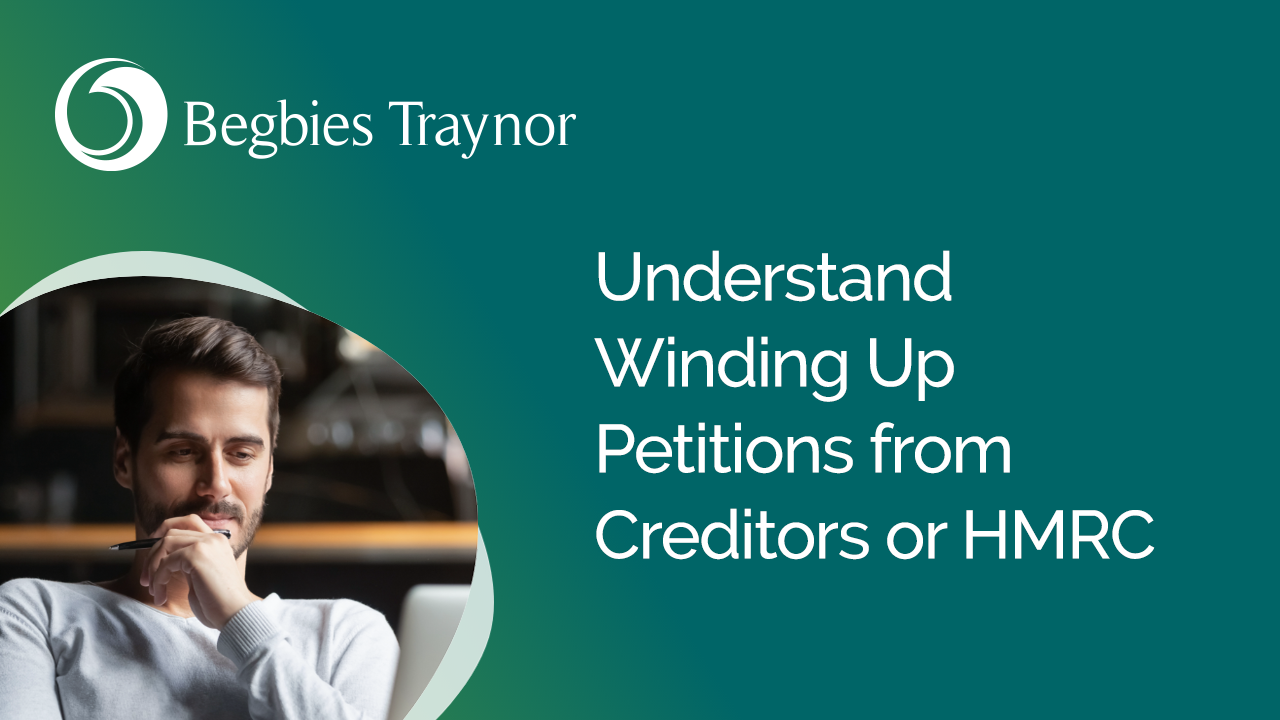Liquidation Support Available
Find the right professional using the below dropdowns. Our reach covers the UK with a network of over 100 UK offices.
Insolvency SupportA Winding Up Petition is the most serious action a creditor can take against your company. A winding up petition involves asking - or petitioning - the court to compulsorily liquidate your company due to its inability to meet its liabilities and pay its debts as and when they fall due.
If a creditor has served you with a Winding Up Petition you should take this action extremely seriously. Failure to deal with the petition will see your company being forced into liquidation and wound up by order of the court.

Once a winding up petition has been served on a company, the petitioning creditor – which could be a trade creditor, lender, or HMRC – can proceed to advertise the petition after a period of 7 days has elapsed. This advertisement will alert other creditors to its existence and stir them into action too. When your bank becomes aware of the petition, they will take steps to freeze the company’s bank accounts meaning no further transactions will be possible.
It is imperative that you speak to a licensed insolvency practitioner as soon as the petition has been received rather than attempt to ‘trade out’ of the problem, as once your bank account is frozen the options available for your company are dramatically reduced.
It is unlikely for a Winding Up Petition to have been served out of the blue. In most cases, it is the final action following a lengthy process on behalf of the creditor to get your company to pay what it owes. It is likely that you will have identified the potential onset of formal insolvency before the petition was served. Creditors will often issue a Statutory Demand before opting for a winding up petition; if you have received a Statutory Demand, you should take this as a warning sign that your creditor is serious about recovering the money you owe.
While receiving a winding up petition is extremely serious, there might still be a chance to rescue the company if you act within seven days of receiving the petition.
From the date of the petition the seven-day countdown begins to pay the amount owed or else mount a defence if you are contesting the existence of the debt or refute the amount owed. If the funds cannot be raised to pay the debt, the assistance of a licensed insolvency practitioner is required. If you are unable to respond or appeal within seven days, it is highly likely that the Court will approve the petition and grant a Winding Up Order. Once this order is granted, the compulsory liquidation process is started and matters are taken out of your hands.

Find Your Begbies Traynor Group Professional
Use our People Search to find the person you need based on location or skillset.
• Your appointed insolvency practitioner could propose and negotiate a Company Voluntary Arrangement (CVA). If the business appears to be viable, this offers the creditor a proportion of the debt over a longer period of time, and allows the company breathing space to turn the business around.
• Apply for an adjournment of proceedings so that the Administration route can be considered.
• Voluntarily have the company placed into Administration – this would prevent a Winding Up Order being issued by the courts. Company assets would be valued and sold by an appointed administrator to cover some or all of the debt. Begbies Traynor has vast experience of company insolvency, and can offer timely advice on all such matters. If the business is viable and is likely to be profitable in the future, we may be able to turn things around.
• Pay all monies due to the creditor, perhaps using asset-financing as a way to raise the funds. Bear in mind though, that the total debt will now include the petitioner’s costs.
• Disputing the debt is an option – this is a serious step, however, and should not be taken lightly. This type of accusation against the creditor is called ‘abuse of court process’ and is one that needs solid evidence to back it up.
• An injunction could potentially be taken out to either postpone or prohibit the petition being advertised in the London Gazette. This would prevent other creditors becoming aware of the situation, an important point as the banks keep track of these adverts and would freeze all company accounts.
Advice on Rescue Options
Arrange a free consultation with an insolvency professional at Begbies Traynor – choose a time at your convenience and with no obligation.
Free ConsultationThis is the general timeline of events once a Winding Up Petition has been sent by a creditor:
1. The petition is served at the company’s registered address, and a date set for the hearing.
2. From this point, company directors have exactly one week in which to act, otherwise the petition will be advertised in the London Gazette, alerting banks to the situation. The bank will then freeze the company account to prevent the disposal of assets, effectively stopping all trading.
3. If the week passes without change, the court will issue a Winding Up Order, the company will be liquidated and the directors will have no further influence on proceedings.
4. Once a Winding Up Order has been issued, company assets will be valued and sold. The liquidator must also investigate the actions of company directors in relation to how the business was run. In some cases, the directors may face accusations of misconduct if they have continued to trade despite being aware of company insolvency issues. In these instances, directors may become personally liable for company debts incurred from the date they knew about the insolvency.
Find the right professional using the below dropdowns. Our reach covers the UK with a network of over 100 UK offices.
Insolvency SupportOnce the winding up order has been made, the compulsory liquidation process will begin. The court will appoint an Official Receiver (OR) who will investigate the company's affairs and the reasons for its failure. In some cases, the Official Receiver will ask an independent insolvency practitioner to take over the administering of the liquidation, although all matters relating to the directors' conduct will continue to be overseen by the Official Receiver.
It is advisable to make sure that all accounting records and other relevant company information is available, whether or not compulsory liquidation occurs. Clear and accurate record-keeping enables the work of the insolvency practitioner to be carried out quickly and efficiently, and in the case of a Winding Up Petition, speed is of the essence.
If company directors are found guilty of misconduct, the result can be fines and/or disqualification from being a limited company director in the UK - this ban can last for up to fifteen years. In serious cases of misconduct, directors could face imprisonment.
Contact Begbies Traynor Group
Our Media Centre
Read our latest news, expert opinion pieces and articles covering the the professional and financial sector.